On this page you find short descriptions of my current and past projects. I mainly focus on the context and my activities in each project. A more detailed discussion of the respective content can be found in the linked publications. Clearly arranged publication lists without additional information can be found here: Google Scholar, ORCID & PUB@Uni-Bielefeld
Current Projects
Resettlement – Living Situation in Countries of First Refuge and Germany
Research project funded by the European Union, in cooperation with the Federal Office for Migration and Refugees (BAMF).
The three year research project started on the 01.05.2024. The first publicly available information about the project can be found in our press release on the Bielefeld University website (in German). More information soon.
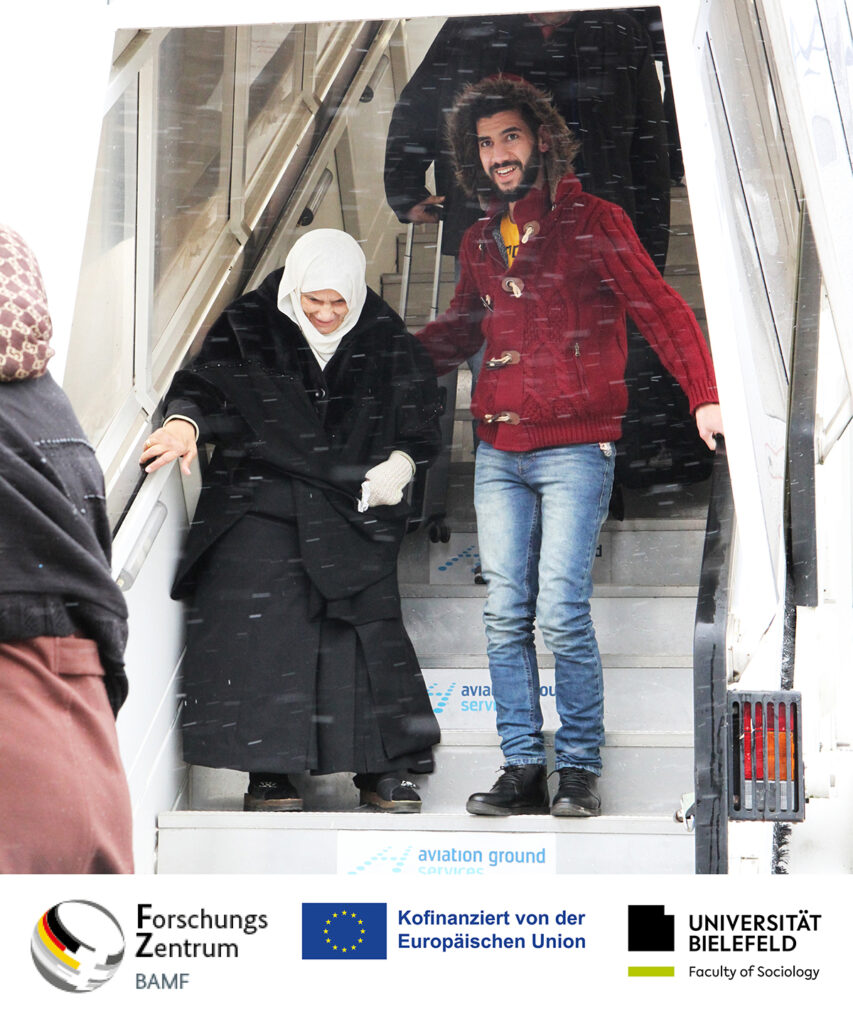
What You’ve Had Ain’t What You Get – How Characteristics of Refugees’ Previous Occupations and the German Labor Market Influence Their Status after Migration
Research Article, with Dorian Tsolak; Work in Progress
We started working on this paper mid 2021. Dorian presented our findings at the 2022 RC28 spring meeting at the London School of Economics (LSE).
Past Projects
Much to Lose, no Credentials to Prove it – Educational Aspirations and Intentions of Adult Refugees as Means of Occupational Status Re-attainment
Research Article published in “European Sociological Review”; March 2025
This paper was written between the end of 2019 (first submission in early 2020) and the end of 2020 (resubmission) in collaboration with Dorian Tsolak at Bielefeld University. After an odd rejection at a very advanced stage of the review process at the previous journal in 2021, it was eventually published in the European Sociological Review in 2025.
We presented the results in September 2020 at the 3rd Conference of the Network for Escape Research (online, originally Cologne), in November 2020 at the joint spring conference of the DGS sections “Education” and “Social Inequality” (online, originally Bamberg) and in May 2021 at IAB ECSR interdisciplinary conference “Refugee migration and integration revisited: Lessons from the recent past” (online, originally Nuremberg). The presented poster is available in German and English. The 2-minute poster pitch at the DGS conference can be found here (in German):
Methoden der Sozialstrukturforschung – Unterscheiden und Vergleichen
Contribution to an edited volume on “Social Structure Analysis” (in German) ; with Jule Adriaans, Andreas Haupt & Christian Schneickert, April 2024
Our contribution to this comprehensive edited volume on “Social Structure Analysis” (edited by Dirk Konietzka & Petra Böhnke) deals with the fundamentals of categorizing and comparing. The first part, written by Andreas Haupt and Christian Schneickert, discusses what characterizes good categorizations and what criteria can be used to evaluate them. This is illustrated for milieus and welfare state regime types. In the second part, written by Jule Adriaans and myself, we discuss what characterizes good comparisons and what trade-offs we usually have to make when comparing categories. We illustrate this for the gender pay gap by also discussing common analytical techniques such as matching and regression analysis to isolate effects for particular categories. The contribution can be found here.
Lokaler Arbeitsmarkt beeinflusst die Berufschancen von Geflüchteten
DIW Weekly Report (in German); with Dorian Tsolak, Jan Goebel & Simon Kühne; July 2023
This DIW Weekly Report is based on our research paper “Making the Match” (see below) and focuses on the practical implications of the findings. In general, we argue that the current regional dispersion of refugees hinders their employment and thus integration prospects, as we found that the local unemployment rate affects not only employment in general, but also refugees’ chances of working in their pre-migration occupation. In addition to the key findings from the paper, we also provide additional descriptive analysis exclusive to the Weekly Report. The report is available here.
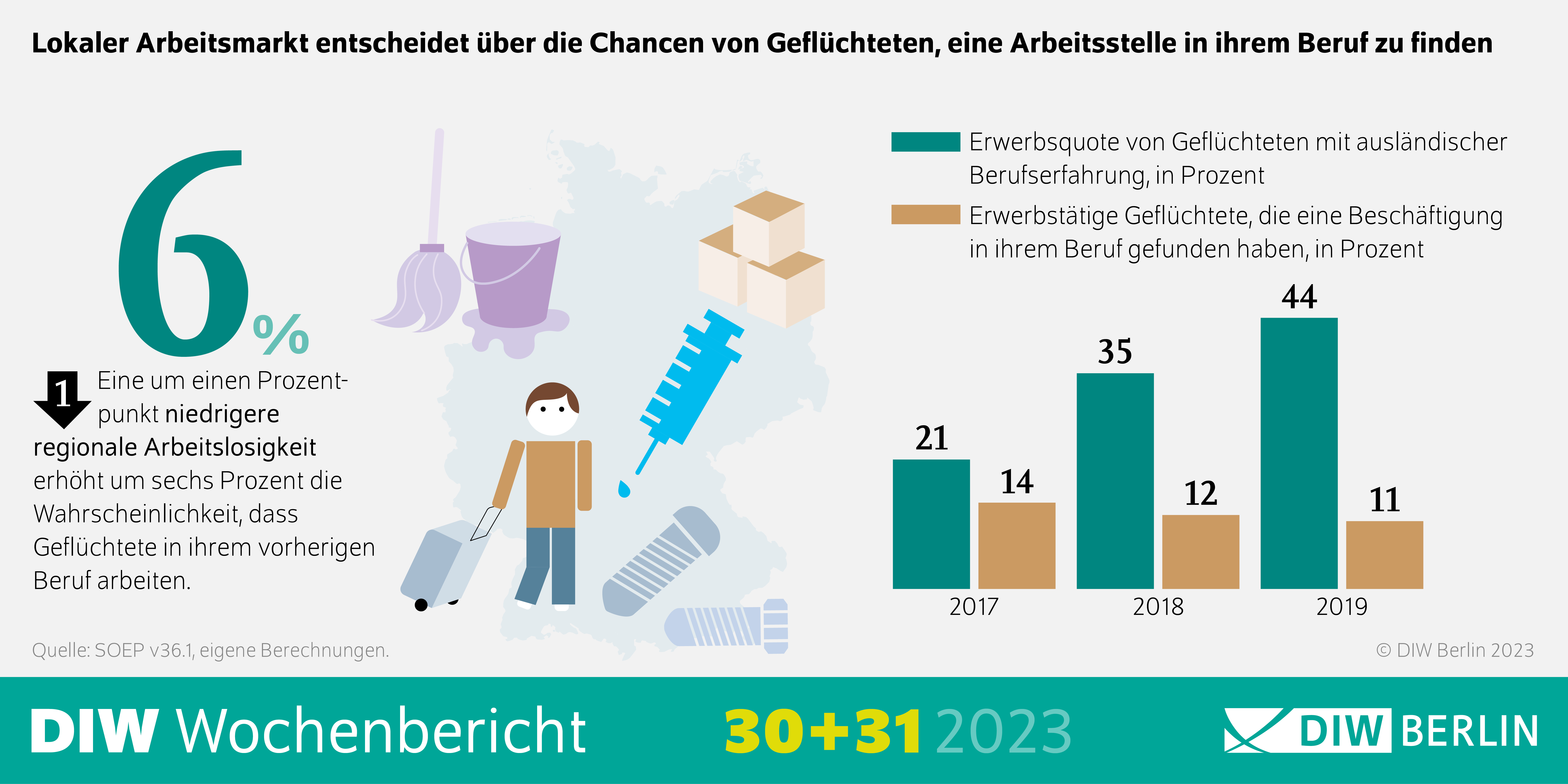
(infographic from the press release)
Making the Match: The Importance of Local Labor Markets for the Employment Prospects of Refugees
Research Article published in “Social Sciences”, with Dorian Tsolak; June 2023
We started working on this paper early 2023. The paper is published since mid 2023 in a special issue on “Regional Development Dynamics and Their Social, Economic and Political Consequences” in “Social Sciences” (MDPI), edited by Stefan Liebig (FU Berlin) and Simon Kühne (Bielefeld University). The paper is available here.
The Importance of Intergenerational Stability for the Social Origins of Undereducation and Overeducation
Research Article published in “Research in Social Stratification and Mobility”; April 2023
I started working on this paper in 2021 and finished the manuscript in Spring 2022. I presented the results at the 2022 RC28 spring meeting at the London School of Economics (LSE). After two rounds of R&Rs, the paper got published in “Research in Social Stratification and Mobility” (RSSM) in April 2023. The paper is available available without a RSSM subscription until the 24th of May 2023 if you use the following link: bit.ly/rssm_buermann. After that, you can access the paper here regularly: sciencedirect.com/science/article/pii/S0276562423000276
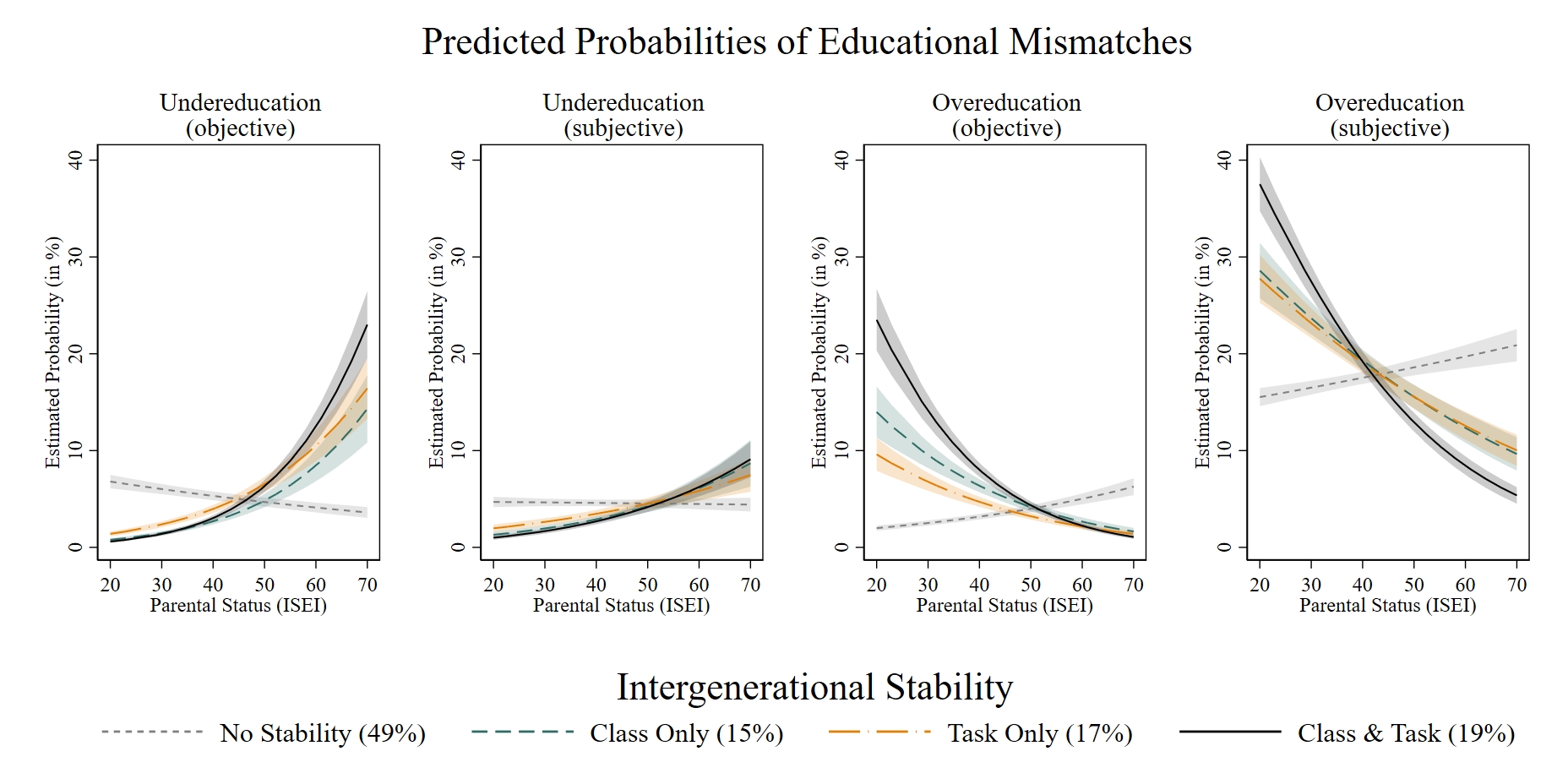
(predicted probabilities figure from the paper)
Did Immigrants Perceive More Job Insecurity during the SARS-CoV-2 Pandemic? Evidence from German Panel Data.
Research Article published in “Social Sciences”, with Jannes Jacobsen Cornelia Kristen, Simon Kühne & Dorian Tsolak; May 2022
We started with this project in Spring 2021 with the first wave of the new SOEP-CoV survey and implemented the second wave during our analyses in the same year. The manuscript was finished in the beginning of 2022 and after a surprisingly short and easy review and publication process, the paper was published open access in “Social Sciences” in Spring 2022. The syntax file I used for the analyses can be found on Github.
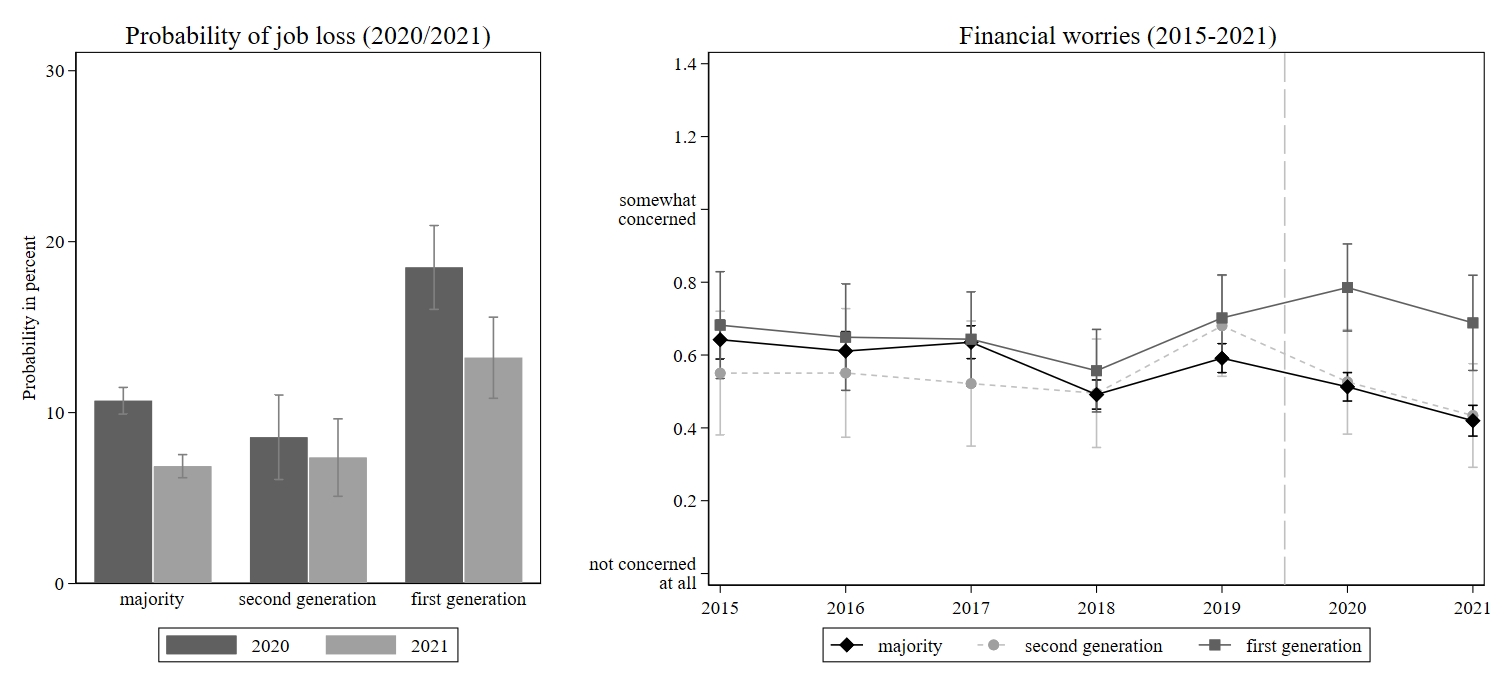
(descriptive figure from the paper)
Migration and intergenerational stability in female employment: The impact of differences between sending and receiving countries
Research Article published in “Journal of Family Research” (JFR), with Dorian Tsolak & Martin Kroh; March 2021
This article was written in collaboration with Dorian Tsolak and Martin Kroh in 2020 and revised in 2021 based on peer reviews. The final article is available open access on the website of the “Journal of Family Research” (formerly “Zeitschrift für Familienforschung”).
Employment rates for female immigrants in the ESS and their mothers
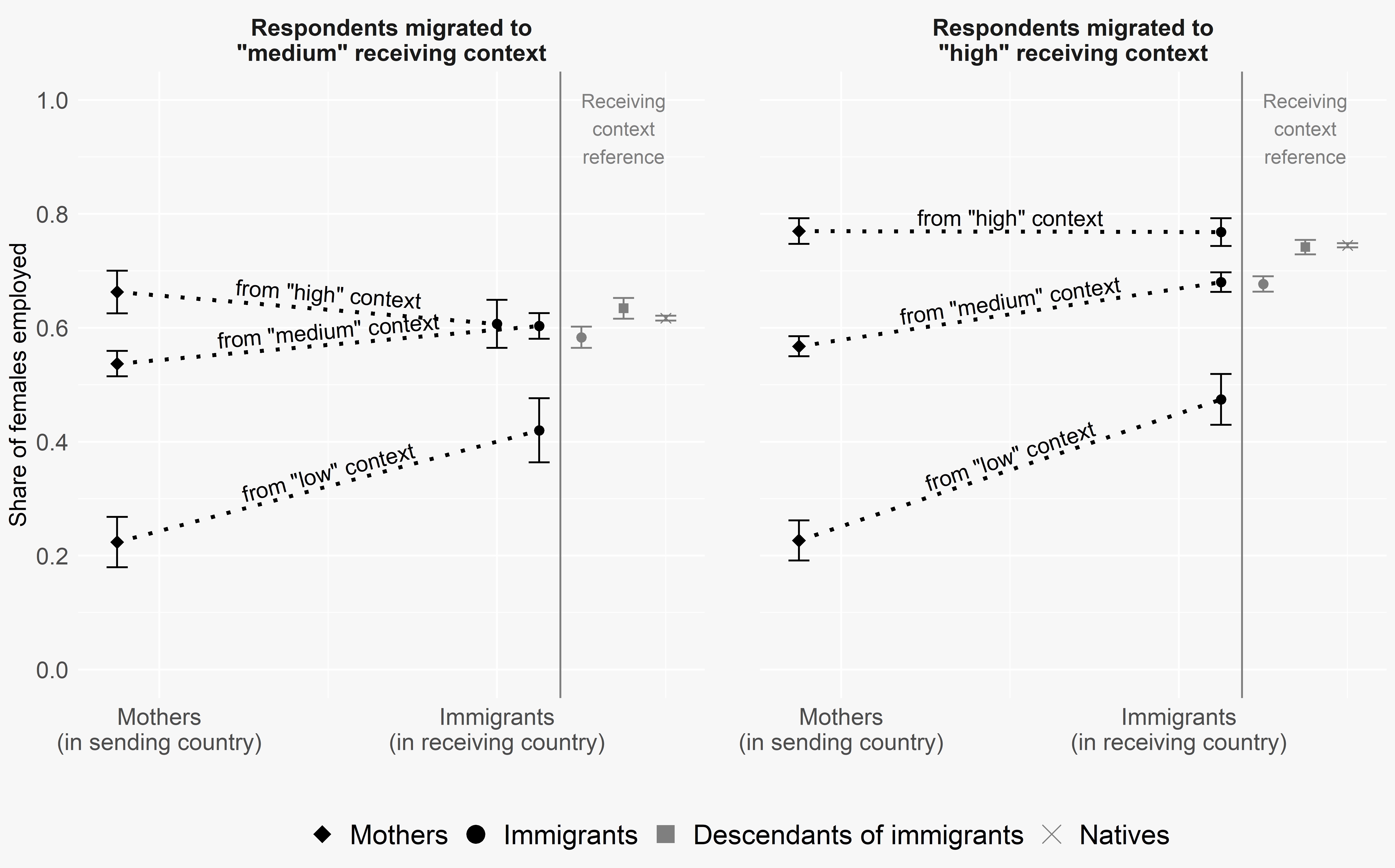
(descriptive figure from the paper)
Closure Through Occupational Standardization?—Signalling Effects of Domestic and Foreign Credentials
Research Article (in German) published in “Kölner Zeitschrift für Soziologie und Sozialpsychologie” (KZfSS); July 2020
This article is the first published article of my cumulative dissertation. It was written in sole authorship in 2018 (first submission) and 2019 (revision and resubmission). The article is available open access on the Springer website of the KZfSS.
After presenting a work in progress version at the international “Labor Market Challenges in Times of Globalization, Technological and Demographic Change” workshop of the IAB and CERGE-EI in Prague in May 2019, I had planned to present the final results at various conferences in 2020. However, most have been completely cancelled due to the COVID-19 pandemic. Among them was the ISA RC28 Spring Meeting “Accumulation and Compensation of Inequalities” in Finland. The English Extended Abstract, with which I was accepted to present the results, can be found here. The RC28 spring meeting was eventually held in 2021, where I was again accepted and presented the results via Zoom. You can find the recording of my 12-minute talk here (discussion excluded for privacy reasons):
Beschäftigung und Bildungsinvestitionen von Geflüchteten in Deutschland
DIW Weekly Report (in German); with Peter Haan, Martin Kroh & Kent Troutman; October 2018
After starting my job at Bielefeld University, I worked with Martin Kroh on a short research report that we wrote together with colleagues from the DIW (German Institute for Economic Research). Martin Kroh and I focused on the labor market integration of refugees (employment and educational mismatches), while the colleagues from DIW analyzed the educational aspirations of refugees (e.g. training and further education). The contribution to the Weekly Report No. 42 can be found on the DIW website as free download.
I presented the results of the weekly report as well as results of further analyses at the 2nd DeZIM Young Researchers Conference at the University of Duisburg-Essen in July 2019 and at the expert workshop “Integration von Geflüchteten in Ausbildung und Arbeit” of the Federal Institute for Vocational Education and Training (BIBB) at the Federal Ministry of Education and Research (BMBF) in Bonn in October 2019.
Ungelernte Fachkräfte – Formale Unterqualifikation in Deutschland
A project of the Bertelsmann Foundation in cooperation with the Chair for Empirical Economic Research of the Ruhr-University Bochum and other professors (publications and website in German); January 2018
In 2017 at the Bertelsmann Foundation, I was primarily dealing with an empirical study on undereducation in Germany, for which I was able to win the Chair of Empirical Economic Research at the Ruhr University in Bochum. In coordination with me, Prof. Thomas Bauer and his colleagues analyzed the determinants, competence differences and effects of underducation on the basis of the Socio-Economic Panel (SOEP) and the National Education Panel (NEPS). A special feature of this study is its methodological transparency since I advocated for the program code (do-file), which was used to generate the results, to be publicly available on GitHub. I was able to win Prof. Eckart Severing (FAU) and Prof. Christian Ebner (University of Cologne) to comment on the empirical results in the corresponding edited volume.
For the interested public I wrote a summary with descriptive figures, in which I summarized the central results of the empirical investigation as well as the commenting essays. In addition, it contains qualitative interviews of undereducated employees conducted by the journalist Johannes Wiek and presented in the form of portraits.
As with the previous studies, I was responsible for the press work. Worth mentioning here is a conversation with Lisa Kreuzmann for an article in the ZEIT, in which I framed the results of the study.
Deutscher Weiterbildungsatlas für Kreise und kreisfreie Städte
A project of the Bertelsmann Foundation in cooperation with the German Institute for Adult Education (publications and website in German); July 2016
The “Deutsche Weiterbildungsatlas für Kreise und kreisfreie Städte” (English: “German Atlas for Further Education in Counties”) is a study that I managed for the Bertelsmann Foundation. It is the follow-up study to the first German Atlas for Further Education (see below) and was published in July 2016. In cooperation with the German Institute for Adult Education (DIE), secondary data were analyzed regionally and key indicators on participation in further education and the supply of further education in Germany were reported. I was involved in the conceptual development of the methodology on behalf of the Foundation. The operational work on the data was done by the Institute (the Institute’s report on the results, including an explanation of the methodology, can be found here), while I prepared a summary of the results and helped to design a website on which the results from the analyses were made accessible. Likewise, we put a Youtube video online in which I briefly explain the most important results in German. In addition, I was responsible for a large part of the press inquiries on the day of the publication. I gave an interview for the Saarländische Rundfunk (SR3), and based on preliminary discussions, the Funke Mediengruppe papers quoted me:
„Insgesamt hat Deutschland bei der Weiterbildung noch viel Luft nach oben. International vergleichende Studien zeigen, dass in skandinavischen Ländern wie Schweden und Finnland deutlich mehr an Weiterbildungen teilgenommen wird. Zuletzt waren sogar bei unseren Nachbarn Dänemark und den Niederlanden die Quoten höher als in Deutschland.“
This quote, which appeared in the Berliner Morgenpost, the Hamburger Abendblatt and the Westdeutsche Allgemeine Zeitung (WAZ) on July 4th 2016, is based on a conservative comparison of the – back then – most recent results of the Labor Force Survey (LFS) and the Adult Education Survey (AES).
At the end of September, I presented the results of the Atlas at the North Rhine-Westphalian Ministry for School and Further Education (MSW). There is a blog post about this workshop which includes the slides from that day (in German).
Deutscher Weiterbildungsatlas für Raumordnungsregionen
A project of the Bertelsmann Foundation in cooperation with the German Institute for Adult Education (publications and website in German); September 2015
The Deutsche Weiterbildungsatlas für Raumordnungsregionen (English: German Atlas for Further Education in Regions”) was the first atlas for further education for me as well as for the Bertelsmann Foundation. During my internship, which I did about half a year before starting my job at the foundation, I accompanied the conceptual work on the study. By the time I started my job as project manager, this conceptual work was largely completed. In addition to final conceptual adjustments, it was now a matter of creating the formats for presenting and referencing the results. For this purpose, I developed two formats in close coordination with IT and design service providers. On the one hand, the summary of the results, which is more focused on print. On the other hand, the website, which logically has an online focus. Both formats proved themselves in their form, so that they could serve as a template for the formats of the second atlas (see above).
Determinanten beruflichen Aufstiegs: Der Einfluss von Unterstützung durch Kollegen und Vorgesetzte.
Bachelor thesis (in German) at the Collaborative Research Center 882 (SFB 882) at Bielefeld University, published as a Working Paper; December 2014
At the end of my bachelor studies, I completed my bachelor thesis under Prof. Dr. Katrin Golsch in the subproject A3 “Geschlechtsspezifische Chancendisparitäten im Erwerbsverlauf” of the Collaborative Research Center 882 “From Heterogeneities to Inequalities”. The thesis, in which I analysed data from the Socio-Economic Panel, has been published in the working paper series of the Collaborative Research Center and is available here.